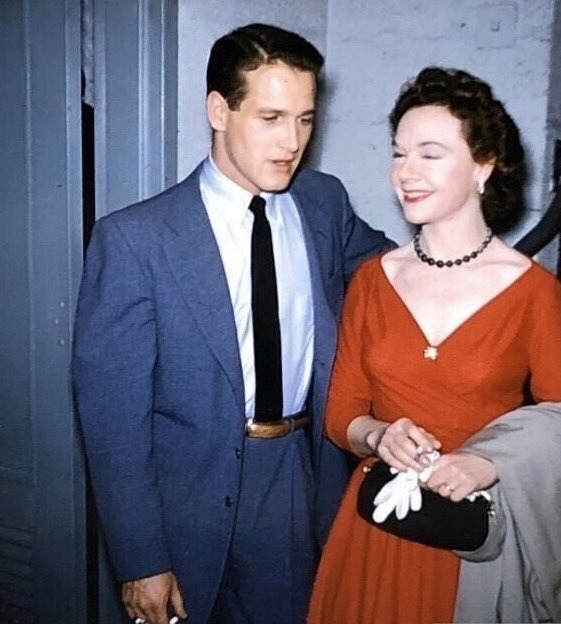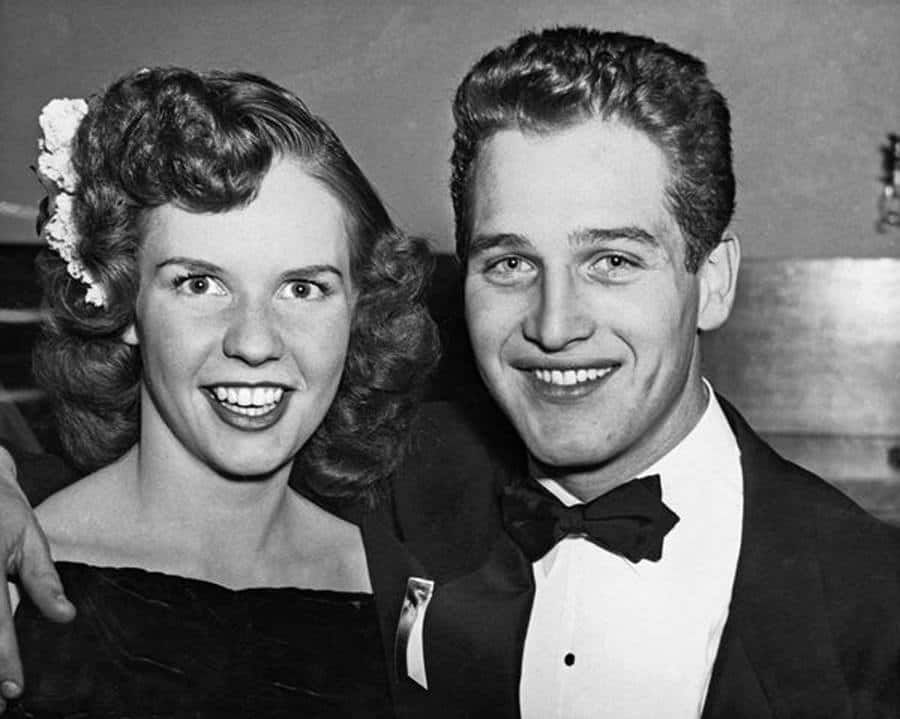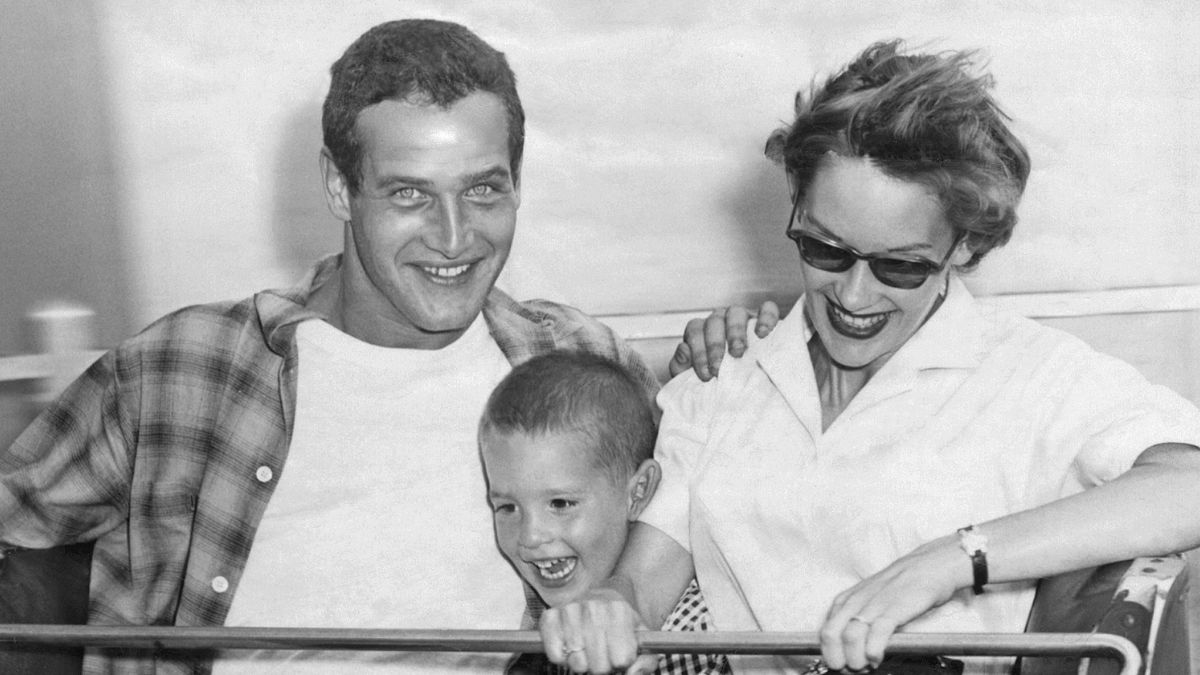Jackie Witte: Before Joanne Woodward - Paul Newman's First Wife
Who was the woman who captured Paul Newmans heart before the world knew his name? Jacqueline Jackie Witte, a figure shrouded in mystery, was the first wife of the iconic actor, a story often overshadowed by the glittering romance that followed, but nonetheless a crucial chapter in the life of a legend.
Her story, like the classic films of the era, holds both a captivating narrative and a hidden depth. Their marriage, a quiet prelude to a life lived in the spotlight, offers a glimpse into a time before the fame, the accolades, and the public persona that defined Newman's later years. Their connection, a tale of youthful love and ambition, met in the crucible of early adulthood, eventually facing the shifting sands of Hollywood's relentless tide. The union ended after nine years, leaving behind a legacy that's as understated as it is profound.
| Category | Details |
|---|---|
| Full Name | Jacqueline Emily Witte (ne McDonald) |
| Date of Birth | September 15, 1929 |
| Place of Birth | Cook County, Illinois, USA |
| Date of Death | May 19, 1994 |
| Place of Death | New York, New York, USA |
| Marital Status | Divorced |
| Spouse | Paul Leonard Newman (married December 27, 1949, divorced January 28, 1958) |
| Children | Susan Kendall Newman, Stephanie Newman, and Elinor "Nell" Newman |
| Occupation | Aspiring Actress, Model |
| Known For | First wife of actor Paul Newman |
| Key Events | Married Paul Newman in 1949, divorced in 1958; Their marriage ended after nine years. |
| Physical Appearance | Tall, blonde hair, dark eyes |
| Education | College Student |
| Legacy | A figure of personal strength and independence, and is often considered a significant, yet often overshadowed, figure in American cultural history. |
| Reference | IMDB - Jacqueline Witte |
Born in Illinois in September 1929, Jacqueline Witte, initially Jacqueline McDonald, entered a world that would soon be reshaped by the economic pressures of the Great Depression. Her life, though relatively undocumented in comparison to the life of her famous husband, followed a trajectory typical of the era. She was a young woman with aspirations. She was an aspiring actress and model. Her marriage to Paul Newman, in Cleveland, Ohio, on December 27, 1949, marked the beginning of a chapter filled with both promise and eventual heartbreak.
The union of Jackie Witte and Paul Newman was in many ways, a product of its time. They married shortly after Newman returned from serving in the Navy during World War II. It was a time of hope and renewal. Young couples, like the newly married Newmans, sought to build lives amidst the postwar boom. Their marriage, however, played out in the shadows of an industry that would eventually cast Paul Newman into the dazzling lights of Hollywood. Before the red carpets, the accolades, and the iconic roles, their connection was a quiet love story, a foundation upon which Newmans future success would be built. During those early years, their focus was not yet fixed on the celebrity spotlight but on building their family and a shared life together.
Their family grew with the arrival of three children: Susan, Stephanie, and Elinor "Nell." This, too, was a departure from the later narrative that would define Newmans public life. This family, while often unseen by the outside world, was a crucial component of the man who would become a global icon. In the 1940 federal census, Jackie, at eleven years old, was living in Beloit, Wisconsin, with her parents Frank and Irene. Frank owned a meat market. She was in the 5th grade at the time. This early life gave few hints of the fame that would later touch her life, but it shows the ordinary beginnings that were common to her generation.
The couple's life changed. As Newman's acting career blossomed, the dynamics of their relationship shifted. The demands of Hollywood, the allure of the spotlight, and perhaps other, unspoken factors began to strain the marriage. Newmans burgeoning career took him away from New York City. His focus was turning towards California as the primary hub for his film work. In 1958, after nine years of marriage, their paths diverged, leading to a divorce that echoed through their personal lives as Newman's fame reached new heights. He would go on to marry Joanne Woodward in the same year, another chapter in the life of the legendary actor, a chapter that became one of Hollywood's enduring love stories. For Jackie, the end of the marriage marked a decision to retreat from the public eye, a choice that has fueled a persistent curiosity about her life and motivations.
The divorce was not the end of Jackie Witte's story, but it was the point at which her narrative moved from public record to a realm of quiet privacy. She chose to step away from the relentless glare of publicity. Her life after the divorce is marked by the very silence that now surrounds her. The details of her later years are scarce, adding a layer of mystery to her life. The circumstances of her death in 1994, on her 64th birthday, remain largely undisclosed, furthering the enigmatic nature of her final years. The absence of readily available information only deepens the interest in her life and her choices. The fact that she lived a life of quiet strength and dignity, outside the glare of public recognition, makes her story more compelling.
In the context of Newmans biography, Jackie Witte often exists as a footnote. She is the first wife, the mother of his three eldest children, a chapter swiftly turned in the narrative of his later, more celebrated life with Joanne Woodward. Yet, it is impossible to fully understand the man without acknowledging the influence of this earlier connection. Her story is not just about a relationship that ended; it is about the foundation upon which a legend was built. Jackie's life was not defined by Hollywood, but by the choices she made. Her ability to step away from the public eye, even as her former husband became an icon, reflects a sense of autonomy and strength. It is a testament to her personal character.
The interest in Jackie Witte continues, a testament to the enduring appeal of her story. She was, in many ways, an embodiment of the post-war generation. She represented an era that combined traditional values with a burgeoning sense of personal freedom. Her marriage to Newman occurred before he was famous. Their connection was an early chapter in his life that helped to shape the man who would become a Hollywood legend. Her story asks us to think beyond the celebrity to the human being and to consider the choices that define us, regardless of the narrative history that surrounds us.
Ultimately, Jackie Witte's life offers a different perspective of Paul Newman. She provides a reminder that even in the most glamorous of lives, there are often hidden stories. Hers is a narrative of quiet strength, a life lived outside the blinding lights of Hollywood, yet connected forever to one of its most luminous stars. Her legacy lies not only in her association with a legend, but in her independent life, choices, and the enduring mystery that continues to fascinate us.


